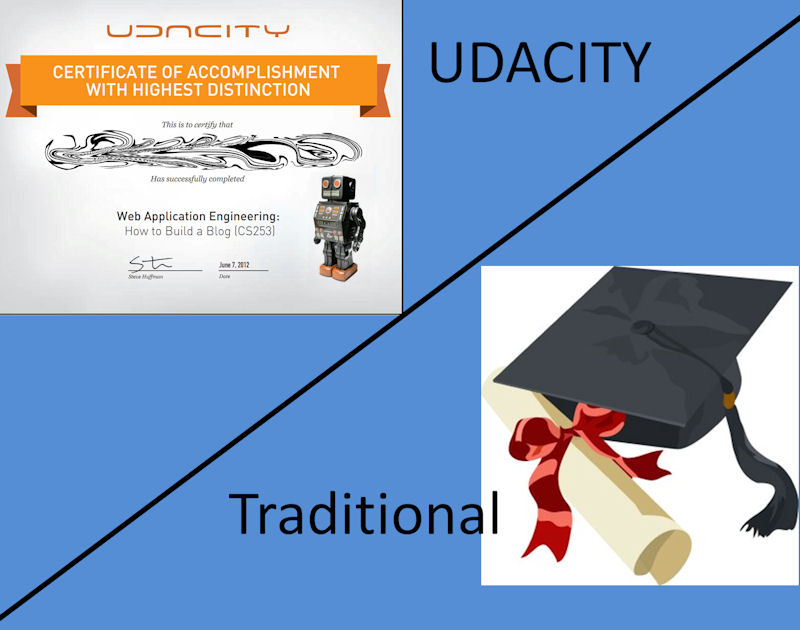Today I got to read an interesting article by David Youngberg , “Why Online Education Won’t Replace College—Yet ” He gives five points to support his beliefs and even took CS101 from Udacity as research. I think he’s very right in his main assumption but he certainly picked five very poor points on which to base his arguments.
I don’t think Online Education will replace College any time soon but I do believe Online Education will dramatically change the face of Education. Getting my degree was a sign of commitment. What I really learned while getting my degree was how to organize my thoughts, how to study and how to learn. When I interview someone for a job their degree is the opener for the interview. Their knowledge and understanding of the skills I need for the job at hand are what gives them my vote.
Please take a look at “Why Online Education Won’t Replace College—Yet “. I’m going to respond, in order, to his five points.
1. It’s too easy to cheat – At least he admits cheating is rampant in college. He’s right, it’s easy to cheat. I think brick and mortar colleges are on an equal footing with MOOC’s here. There’s nothing that prevents me from cheating but I don’t learn anything either.
2. Star students can’t shine – What course was he taking? The forums make it very easy for the star students to shine. The ones that helped everyone understand, the ones that always seemed to push the assignment a little farther. In my Cryptology class it was certainly the one that was correcting our instructor. In creating special projects outside of the classroom, Udacity give lots of opportunity to shine. You can’t shine without participating in the community but I saw a lot of people shine.
3. Employers avoid weird people – Please explain what weird is in this day and time. Several of my professors were certainly on the fringe. Should I be emulating them?
4. Computers can’t grade everything – I actually agree here. Then again, as colleges crowd more and more people into a classroom to cut costs, neither can the professors and teaching assistants. I think this is a draw that technology is gaining on.
5. Money can substitute for ability – I’m not sure I understand his point. He’s right in what he says but it has nothing to do with the topic at hand. Both brick and mortar colleges and MOOC’s have the same disadvantage. Money can buy knowledge and tutoring, it’s been this way since professors started charging for a living.
It’s my belief that Mr. Youngberg took CS101 as an exercise to see what his competition was. In doing so, he compared it to the traditional model of education and found it lacking. I don’t think he really took part in the community or opened his eyes to the potential of the Udacity model.
For me, Udacity fills a gap that my college never would. When I needed to learn programming , going back to my college was the last choice I would have made. Udacity certainly doesn’t have a degree plan, yet, but as I change job assignments and responsibilities, Udacity makes it possible for me to learn new skills. When I take a course it’s still up to me to use or ignore that knowledge. Without a financial stake in the course, it’s that much easier for me to walk away to walk away.
Over the next few years, both MOOC’s and the traditional colleges will have to evolve. From what I’ve seen, Udacity can and will evolve a lot faster than traditional colleges. I’ve seen a number of changes in Udacity over the last year and expect to see a lot more. I’m just rejoicing I don’t need a parking permit to take a Udacity course.
© 2012 – 2019, Byron Seastrunk. All rights reserved.










